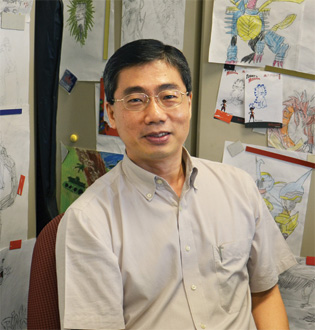Young Children’s Voices in Mathematical Problem Solving
Contributed by Dr Ho Siew Yin and Sng Wei Qin Abbie, from NTUC First Campus, for SingTeach Virtual […]
Read More
Teach the way you want others to teach your own children, says Dr Daniel Tan. He shares practical insights into what makes a good Science teacher in today’s changing educational landscape.
“Teaching is like marriage,” says Associate Professor Daniel Tan. “You have to be committed to it.”
He had never thought of becoming a teacher, until a scholarship interview changed the course of his life. “They asked if I would like to teach and I said I’ll try.”
This leap of faith launched Daniel’s teaching career. A Science teacher for 7.5 years before joining NIE’s faculty 13 years ago, he now holds the position of Deputy Head for Teaching and Curriculum Matters in NIE’s Natural Sciences and Science Education Academic Group.
“You need ability and opportunity for expression of ability, to fine-tune your ability and learn from experience. What to do and what not to do, even what to say – these come with experience.”
 With an emphasis on 21st century competencies today, the ability to think critically has come to the fore. “Science teachers need to be able to think critically themselves, to question what they have learned. If they themselves can’t think, then they can’t expect the students to do likewise.”
With an emphasis on 21st century competencies today, the ability to think critically has come to the fore. “Science teachers need to be able to think critically themselves, to question what they have learned. If they themselves can’t think, then they can’t expect the students to do likewise.”
In today’s Science classroom, for example, ICT is used to present concepts through simulations and animation and to enable collaboration among students. But Daniel reminds us that technology is merely a tool to facilitate learning.
Daniel believes “the basics remain the same – getting students to think about what they are learning. And there are many ways to do this. The trend now is more group and collaborative learning.”
Much can also be learned from more experienced teachers. “Teachers can reflect on how a good teacher influenced him or her in the past. Look for mentors in school, as they will help you gain experience much faster.”
Beyond competence, Daniel believes the one quality that sets a good teacher apart is care for students.
“Treat your students as persons of worth and don’t give up on them. And students know you care for them; even when you have to punish them, they will know it’s for their own good.”
The way a teacher interacts with the students matters because teachers are role models of values and behaviours. “Whatever you want to inculcate, the teacher must show it and embody it. Teach your students the way you want other teachers to teach your own children!”
These are the most valuable lessons they will take away from the classroom. This commitment to care is also what facilitates learning and creates a joy for learning.
“A good teacher must be able to touch the hearts and minds of the students, to inspire a love for learning of Science. If the students know that the teachers care for them, they will be more motivated to learn.”
“A teacher must want to teach,” he says. “The challenge is to wake up every day and want to go to school, to teach, to share knowledge and skills.”
Passion for the subject also matters. “Pass the passion to students,” urges Daniel. “If they are interested, they will be motivated to learn.”
– Assoc Prof Daniel Tan, Natural Sciences and Science Education Academic Group
This enthusiasm is sometimes hard to maintain – and there will be hard times – but Daniel’s encouragement is to press on. “If you have already made a decision to teach, make the best out of it,” he says.
“Believe in yourself. Hard times will soon be over. Like a marriage, it comes down to passion and commitment. Even after the initial passion wears off, the commitment keeps you going. It will pull you through the ups and especially the downs.”
His experience has proved that there are more ups than downs, though the rewards may only be realized much later. “At that time, you may seem harsh. Only later will your students understand and they will appreciate what you had done.”
“It boils down to commitment to continue with the journey,” Daniel reiterates. The experience earned and lessons learned through this journey are what eventually make a good teacher great!